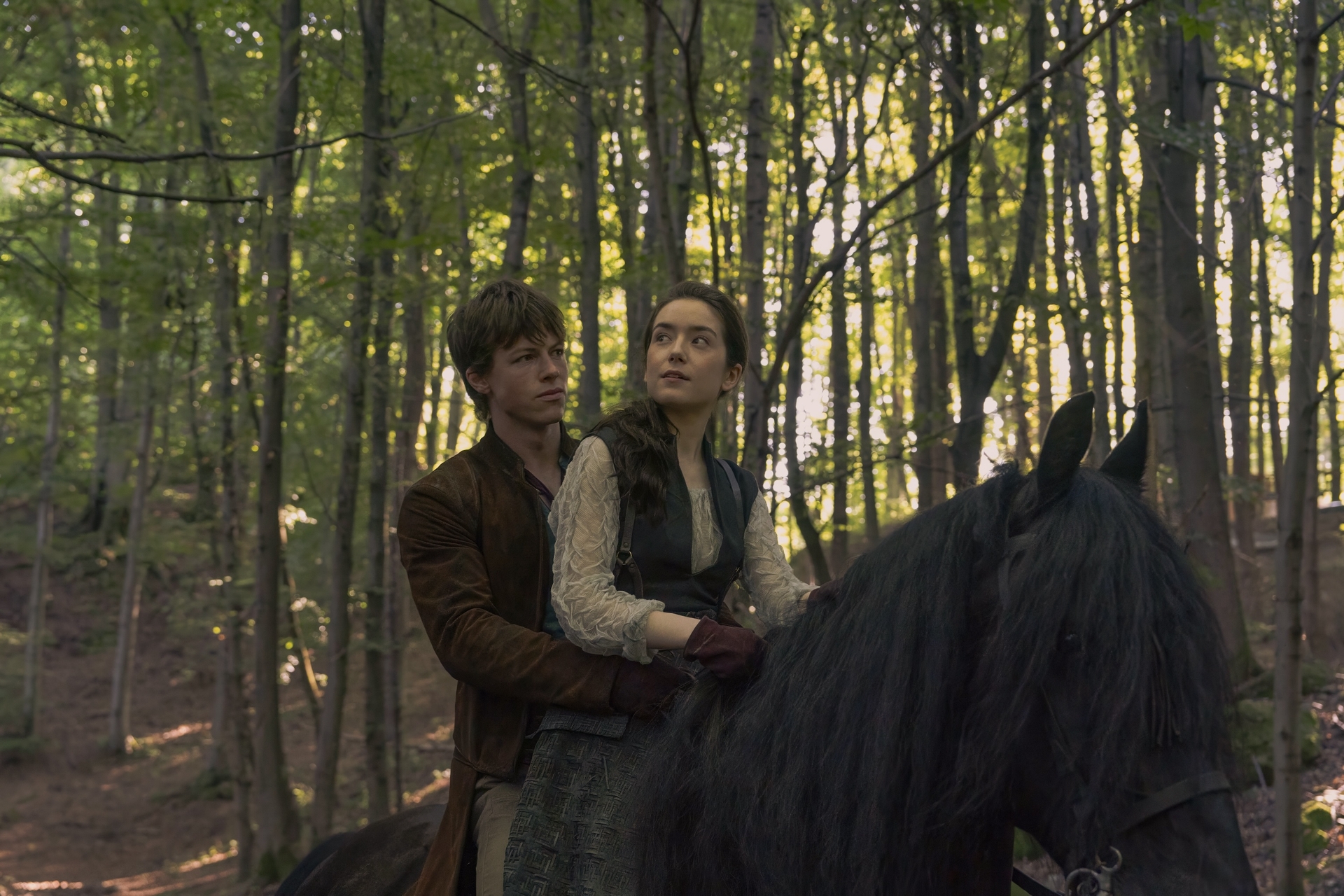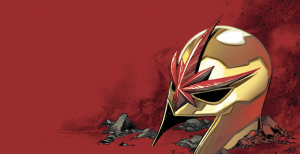
This article contains spoilers for Dune: Prophecy episode 3 and details from the Dune book series.
Whatever one thinks of Dune: Prophecy, not many would call the prequel series “romantic.” And yet, a moving scene does indeed occur midway through the third episode, “Sisterhood Above All.” After a night of passion, a fetching and shirtless Orry Atreides, played by Milo Callaghan, awakens to find his beloved Tula (Emma Canning) wracked with guilt.
“I lied to you,” she says. “My name is not Tula Veil. It’s Tula Harkonnen.”
Orry handles the news shockingly well. And to fully comprehend the depth of his dreamy and kind response — and the insult that would drive Tula to murder Orry and all of his family — one must go deep into Dune lore, as depicted in Brian Herbert and Kevin J Anderson’s Legends of Dune series, a story that includes not too many sensitive hunks but a whole lot of cyborgs and a man called Vorian Atreides.
Before the Atreides
Given the venom with which Valya, in both her younger Jessica Barden and older Emily Watson form, pronounces the name, viewers can guess that Vorian Atreides is a controversial figure. It’s his actions that lead to the Harkonnens being relegated to the fuzzy whale trade and to the death of beloved Griffin Harkonnen.
But given Valya’s propensity for lying and exaggeration, viewers are also right to wonder if there’s more to the story. To understand Vorian and his place in the larger story, we must first understand his father Agamemnon. No, not the pity-party-prone king from The Iliad… but also, kind of the pity-party-prone king from The Illiad.
Agamemnon was born Andrew Skorous in the year 1300 BG (about 9,850 years from now). Believing himself to be a descendent of the aforementioned King Agamemnon, Skorous saw himself uniquely fit to give direction to an aimless society. So devoted to the cause was he that he took the name Agamemnon, the first of a group of leaders called Titans, and took control of the Artificial Intelligence networks that ran the world. As the leader of the Twenty Titans, Agamemnon exerted unyielding control over the world. And when he feared he could not complete his work during a human lifetime, Agamemnon put his brain in a mechanical body, becoming a cyborg known as a cymek.
Using the genetic material from his human body, Agamemnon grew 13 sons to carry on his work. All but one failed him and were destroyed. That one who survived? Vorian.
Vorian Atreides, Xavier Harkonnen, and Abulurd Harkonnen
Although Agamemnon resented the arrival of the AI overmind Omnius, he still sided with the machines instead of the humans in the lead up to the Butlerian Jihad. That allegiance made Vorian one of the human trustees in the empire of Omnius, pitting Vorian against his fellow humans. However, Vorian soon fell in love with Serena Butler, an enslaved noblewoman in the house of the machine Erasmus. Between Serena’s hatred of machines and his own investigation into his father’s ideas, Vorian’s sympathies turned toward the humans. By the time Erasmus killed Serena’s child Manion, Vorian was ready to side completely with the humans in the Machine War.
Given his connections to Agamemnon and his initial support for the machines, the humans initially mistrusted Vorian. That was especially true of Serena’s lover Xavier Harkonnen, the father of Manion Butler, murdered by Erasmus. Xavier put Vorian through rigorous examination and even doubted him after Truth-Sayers and doctors declared him free of machine influence.
Despite their initial conflicts, Xavier and Vorian soon became close friends. Their military genius and different styles of attack made them formidable opponents to the machines. The two rose together to glory, until they discovered that Grand Patriarch Iblis Ginjo, a key human leader in the Butlerian Jihad, had been working with the Tleilax to harvest organs. Xavier sacrificed himself to Iblis and stop the trade, but the religious furvor around the Jihad saw the Grand Patriarch as a martyr to the cause, on the same level as Manion Butler and Serena Butler.
Because they refused to accept that Iblis Ginjo had been corrupted, the humans branded Xavier Harkonnen a traitor. Vorian fought to redeem the name of his old friend, but the fanatics wouldn’t hear it.
Thanks to an anti-aging process granted by his father, Vorian remained young for a very long time, which helped him rise the ranks in the human army, eventually earning the title Supreme Commander. Yet, he never forgot about his old friend Xavier. When he learned of Xavier’s grandson Abulurd Butler in the Jihad army, Vorian helped the young man reach success.
Vorian and Abulurd became close friends, especially after the former told the latter the truth about Xavier’s actions. In response, Abulurd took the name Harkonnen in hopes of redeeming family’s reputation.
The two fought closely together and even played key roles in the final defeat of the cymeks, a battle that won Vorian universal praise from humanity. However, the power began to corrupt Vorian. When Vorian ordered an attack on Omnius that would result in the death of two million humans, Abulurd refused and disabled the fleet’s weapons.
After the defeat of Omnius and the machines at the Battle of Corrin, Abulurd was sentenced to death for his actions. However, Vorian interceded and ordered him branded a coward. Where all of the other families would take new names (Vorian chose his from King Agamemnon’s father Atreus, taking the name Atreides), the Harkonnens would forever keep their shamed name when they went to Lankiveil. So powerful is the memory that, in “Sisterhood for All,” Mother Doretea sneers at Valya, “You’ll always be a Harkonnen.”
Vorian Atreides and the Death of Griffin Harkonnen
As we saw in “Sisterhood Above All,” Valya still blames Vorian for betraying his friend Abulurd. In fact, she mocks Abulurd’s grandson Evgeny (Mark Addy) for failing to remember how his grandfather was wronged.
Valya wasn’t the only member of her family who hated Vorian. Valya and Tula’s ambitious brother Griffin wanted to redeem his family name by getting revenge on Vorian. He followed Vorian to Arrakis, where Vorian was sent by Emperor Salvador Corrino I.
Within a Fremen seitch, Griffin found Vorian and the two began a fight to the death. Midway through the battle Vorian learned that his wife Mariella had died, a revelation that overcame him with grief and allowed Griffin the upper hand. However, Griffin chose mercy instead.
Because the two did not kill one another, as demanded by Fremen law, both Griffin and Vorian were sent to the desert. There, two late-born children of Agamemnon found Vorian and tried to force him to join their cause to launch a new time of the Titans. Vorian stopped Agamemnon’s children, but they managed to kill Griffin. Vorian tried to explain to Valya what happened, but she refused to hear, and swore revenge against all the Atreides. These events are depicted and referenced in Herbert and Anderson’s Sisterhood of Dune and its sequel Mentats of Dune.
Orry Atreides and the Coming of Paul Atreides
We see the first steps of Valya’s revenge plot in “Sisterhood Above All,” when Tula kills Vorian’s grandson Orry and other family members. However, that’s far from the end of the battle. It would be spoilers for Dune: Prophecy to say how Valya’s quest ends, but just keep in mind that Vorian lives a very, very long time and has his own plan for settling the feud on peaceful terms.
However, anyone who has seen the Denis Villeneuve movie knows that both Vorian and Valya ultimately fail. By the time that the first movie begins, 10,000 years after the events of Dune: Prophecy, the Atreides may have so much respect in the Imperium that they threaten the power of the Corrino Emperors, but the Harkonnens hate them even more.
Of course, it’s the Harkonnens plotting that allows Paul to become Lisan al Gaib. After all, if Baron Harkonnen hadn’t conspired with Emperor Shaddam Corrino IV to make the Atreides the new stewards of Arrakis, and then failed to kill Jessica and Paul, then Paul wouldn’t have have met Stilgar and accessed the Water of Life to become the Kwisatz Haderach.
In other words, Orry’s death might have been a short term victory for Valya and massive sacrifice for Tula, but it only led the way for the Atreides’ ultimate ascension through Paul.
Dune: Prophecy airs Sundays at 9 p.m. ET on HBO and Max.
The post Dune: Prophecy – Orry Atreides and the History of the Harkonnen Feud appeared first on Den of Geek.











